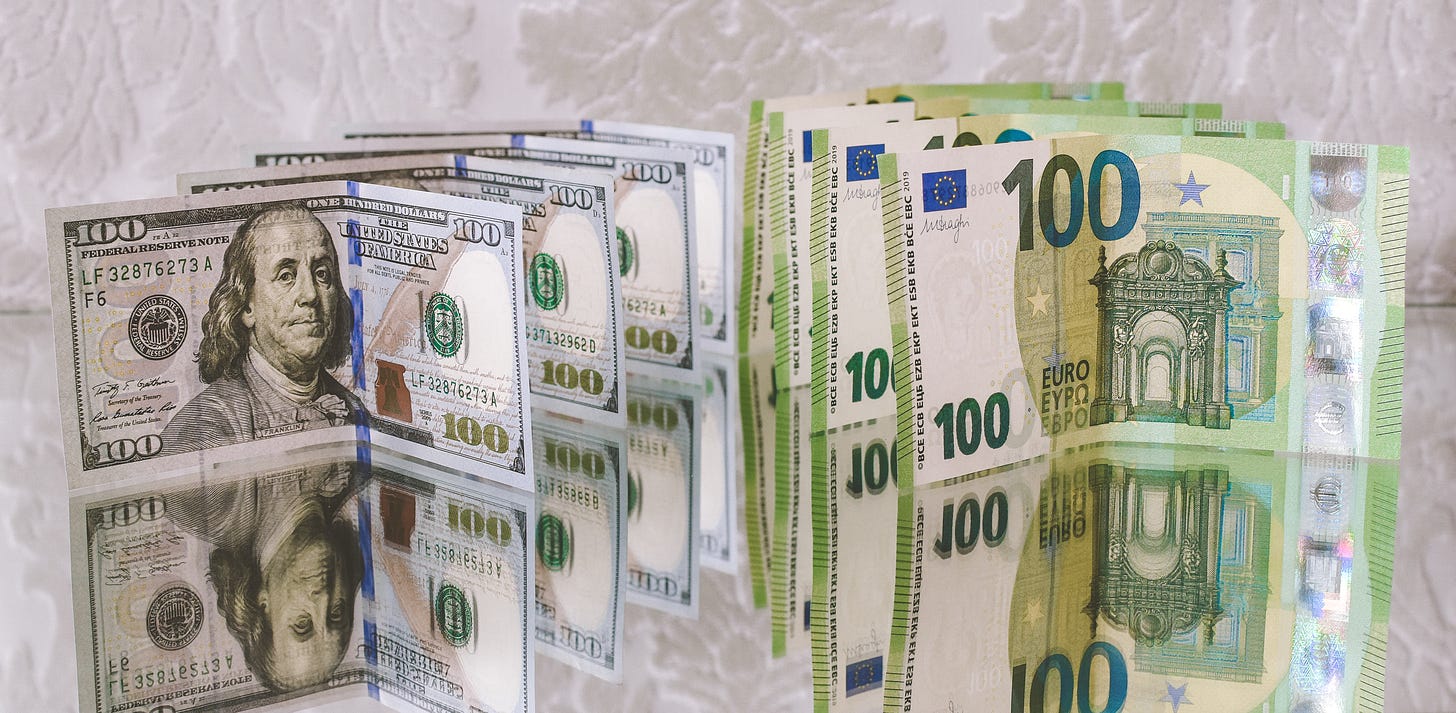
If you have taken a trip to Europe in the last two decades, you've probably learned just how deceptive the exchange rate can be. What appears to be a moderately priced meal can come with a bill that is much heftier than expected. While this has been the case since 2002, the Dollar has finally reached parity with the Euro. Coverage in U.S. Media and European Media point to contractionary policy and the European energy crisis as the main contributors driving the currency conversation.

The mighty Dollar:
This summer, an already strengthening Dollar began to soar. The sharp increase is due in large part to the Federal Reserve's aggressive interest rate hikes aimed at combatting inflation. Because of this policy, media coverage has turned to the Fed when writing about the Dollar's strength.
In the aftermath of the Euro's dip below the Dollar on Monday, phrases such as "central bank," "rate hikes," and "federal reserve" saw a significant rate of increase in the Media. These mentions make it clear that monetary policy is at the center of the conversation about Dollar/Euro parity.
Further highlighting the U.S. Media's internal focus is coverage of Jackson Hole. U.S. and European media mention the Wyoming ski-town as a top keyword when talking about the Euro. Jackson Hole accumulated 252 specific mentions in the euro/dollar conversation in anticipation of the annual Economic Policy Symposium. Doing little to quell recession fears, fed chairman Jerome Powell said there would be "some pain" in the fight against inflation.
The U.S. can't take too much credit, however. The Dollar's rise has much to do with the Euro's fall.
Currency gone cold:
Europe's ongoing energy crisis is one of the leading topics covered by both U.S. Media and European media. As the EU's primary currency goes cold, millions of Europeans are in danger of going cold themselves. Rising energy prices are one of Europe's main problems driving inflation and have stirred fears of an inadequate gas supply for winter. The increase is primarily due to the European countries' significant dependence on Russian energy exports, which have drastically slowed since the invasion of Ukraine.
How reliant is Europe? In 2021, Russia accounted for roughly 40% of all natural gas imports to European countries. Most notably, Germany relies on Russia for 49% of its natural gas. Indicating a heightened concern, Germany amplifies the Euro/Dollar narrative more than any other European country.
The Ukraine war has exposed the downfall of putting eggs in the Russian energy basket. German gas supply has been mainly at the will of Russian gas giant Gazprom, raising questions about whether Russia would be willing to cut off supplies completely. These concerns are reflected across the board as "natural gas," "oil prices," "energy prices," and other similar terms take over coverage of the Euro and Dollar.

While other issues have proved significant, the media has turned to energy as the biggest pain point when discussing Euro-Dollar parity.
What does this mean?
Simply put, the parity approach is basically "like getting a 15% discount" for Americans. Compared to the $1.18 per Euro seen last July, the cost of vacation is more affordable than ever. On a less fun note, multinational companies and foreign governments will feel the sting. Businesses that conduct operations in dollars are not getting the bang for their buck like they used to with a strong dollar. What is convenient for Americans may slow down the global economy even further.
Outlook:
While Euro's decline is a lucky break for the American Traveler, it is indicative of a global economy on edge. Drawing a bigger picture, U.S. and European media are looking at both America's tightening monetary policy and the massive energy crisis in Europe as the cause. As Europe heads toward winter and Jerome Powell continues to signal a hawkish policy, the Euro has a strong possibility of falling even lower.
To see how coverage of this narrative continues to unfold, check back to see this automatically updating narrative intelligence brief: